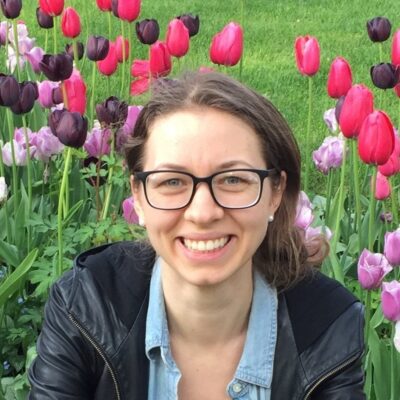Alumni Spotlight: Frieda Kay, M.S. ’22

May 6, 2024
Frieda Kay, M.S. ’22, is an alumna of the natural resources and the environment master’s program with a concentration in the human dimension of natural resource management and a graduate minor in city and regional planning at Cornell, during which she was advised by Richard Stedman. She is now a research consultant with the Environmental Grantmakers Association and founder of 2nd Brain Sessions.
Tell us about your current position and what you find rewarding about it.
My part-time position with the Environmental Grantmakers Association allows me to contribute to an organization doing meaningful work and gives me the flexibility to develop 2nd Brain (2B) Sessions.
2B Sessions are supported work sessions—somewhat like a combination of co-working, coaching, and consulting—for getting real work done in real time. I’ve worked with people doing many things, including academic writing, business development, and everyday tasks. When I meet with clients, I draw on my experiences as a facilitator and mediator to help them clarify their path forward, summon enthusiasm, and take purposeful action.
It’s exciting to be able to provide and promote the relational support that my peers and I found so helpful for our own success in graduate school.
How did your Cornell graduate education prepare you to succeed professionally?
Cornell gave me the opportunity to work and study alongside people who think and work in many different ways. My research was very interdisciplinary so I’d move between classes with planners, engineers, and sociologists, viewing similar issues from different perspectives. This was great preparation for 2B Sessions, where I facilitate projects with people from a variety of backgrounds. Grad school was also a challenge for me; a reckoning of learning to accept and work with my brain. I’m grateful for the freedom and flexibility from my advisor to forge my own path and cultivate the necessary practices and support structures, which provide the foundation for professional success as well.
What inspired you to create your business, 2nd Brain Sessions?
2B Sessions was inspired by my thesis-writing experience at Cornell and the collective support I developed with my peers. We started a weekly discussion group for sharing successes and struggles: a non-judgmental space where all we had to do was show up. Our virtual co-working sessions provided much-needed structure for unscheduled time. I also met with a tutor from the Writing Center for more hands-on support and used our meetings as active work sessions by sharing my screen and typing or talking through any points I was stuck on. As I shared this real-time collaborative support, I heard from others that it was both incredibly valuable and deeply resonant—an essential form of support we hadn’t previously known how to ask for.
Can you tell us more about it?
2B Sessions might be best described as “relational support for getting things done.” It combines three key elements together into one real-time work session: a dedicated time to work, a non-judgmental space to show up as you are, and the adaptive support from an engaged partner to respond to whatever you need in that moment.
More broadly, it aims to highlight and mainstream the importance of relational support. Our prevailing culture seems to glorify hyper-independence, but many people work better in collaboration, and that’s so important to embrace and make space for. The tagline on our website is “You don’t have to do it all alone.”
How are you giving back to Cornell through 2nd Brain Sessions and how is it supporting Cornellians?
This is exactly the kind of support I personally needed at Cornell, so I want to make 2B Sessions available as a service for current students, especially those struggling with executive function. So far, I’ve met with Flor Ardon with Neurodiversity@Cornell, and Janna Lamey with the Graduate School to get on their radar as a resource to share.
What do you enjoy doing outside of work?
I really like to travel, especially by train. I love watching the changing landscapes, I appreciate slow travel time, and I always enjoy the people I meet along the way. After grad school, I actually traveled around the country, mostly on Amtrak, working remotely and spending time visiting friends and family. I love exploring new places, wandering through neighborhoods, hiking up mountains, and taking pictures of wildflowers.
If you could go back in time to the beginning of your graduate career, what advice would you give yourself?
One piece of advice I’d give myself is to make space for difference: it brings so much opportunity, and it’s pointless to compare yourself to others. Instead, I would encourage myself to find like-minded people and figure out how you can support each other.
I would add that persistence matters more than consistent output, so don’t give up on showing up—even the tiniest step will move you forward. Also, be kind along the way. Curiosity and compassion will get you a lot farther than judgment and criticism. And remember your breath. It’s always there for you.
